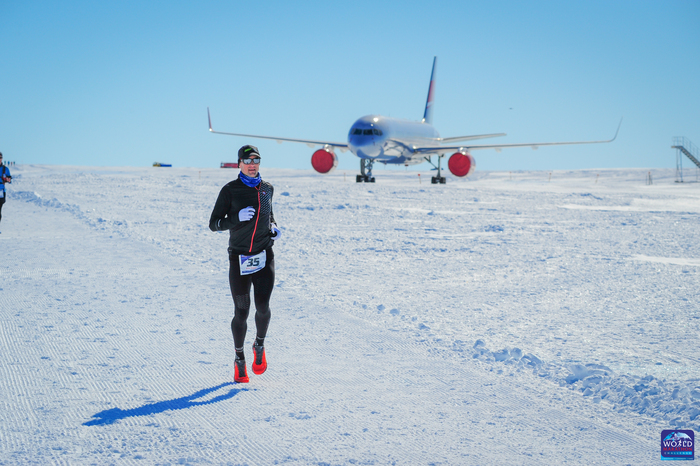Key points
- Eric Tozer, a type 1 diabetic, completed seven marathons in seven days on seven continents, demonstrating the potential of those with diabetes.
- Tozer emphasizes the importance of community support in managing diabetes and achieving personal goals.
- Technological advancements in diabetes management, such as insulin pumps, have significantly improved the quality of life for diabetics.
- Tozer founded the Diabetes Sports Project to inspire and empower others living with diabetes through the achievements of diabetic athletes.

Running a marathon isn’t easy. But running seven marathons on seven continents in seven days — with type 1 diabetes? It might sound impossible, but not for Eric Tozer.
We spoke with Eric, diabetes ambassador and founder of the Diabetes Sports Project, for tips on living with diabetes and pursuing your dreams after diagnosis.
Take us through your journey with diabetes
From first getting diagnosed to making history as the first diabetic to complete the World Marathon Challenge.
I wasn’t diagnosed until my early 20s. The diagnosis turned my world upside down: at the time, I didn’t even know there was a difference between type 1 and type two diabetes.
But I grew up playing sports, so I already had a competitive mindset. I said, “I don’t want this to stand in the way of doing what I want to do.”
When I first heard about the World Marathon Challenge, which is seven marathons on seven continents in seven days, it was far out of my comfort zone — and that’s why I knew I had to do it. I wanted to challenge myself, but more importantly I wanted to show what’s possible for someone with type 1 diabetes.
The Word Marathon Challenge is an adventure of extremes, from running on packed snow in -20º in Antarctica to 95 degrees on sweltering pavement in South Africa just a day later. There is a plane waiting for you to finish so you can get to the next destination.

From racing in the dark in Spain to throwing up in Chile, FaceTiming my wife and daughters from the race in Australia, seeing the sun rise over the Burj Khalifa — it was full of highs and lows, and I couldn’t have done it alone.
The World Marathon Challenge is an intentionally extreme example. If I can do something as crazy as that, then you can live your dream — whatever it is.
A marathon is technically a solo sport, but it’s a lesson in the power of community: no one can run a marathon without support. The diabetic community gave me a reason to do it, and then they got me through it.
What advice would you give to someone recently diagnosed with diabetes?
#1: You’re not alone! Get plugged in to the community as soon as you can, from the hashtag #t1dlookslikeme to the Diabetes Sports Project, Facebook groups, and local JDRF chapters.
For kids, I highly recommend diabetes camp: a summer camp where all the camp counselors and kids also have type 1. Kids who attend gain confidence, make lifelong friends and role models, and get to enjoy the classic childhood experience of summer camp that they might not get to otherwise. The days of feeling alone with type 1 are over.
What tips do you have for living with diabetes?
Diabetes is a 24/7 disease, so managing your diabetes is all about the small daily victories and healthy habits. You quickly learn to understand how what you eat and how you move your body affect your health, because one miscalculation could send you to the hospital.
Now is the best time in history to be diagnosed with diabetes. The devices are smaller and more accurate, the insulin is longer-lasting, and we know more about how to manage our diabetes than ever before.
Every three months I have a checkup with my endocrinologist for a diabetes test. It used to be that I'd get checked every three months, but now my device checks my levels 288 times a day. Instead of getting up in the middle of the night to check my levels, the insulin pump does it automatically so I can sleep through the night. It’s a game changer.
You inspire a lot of people. Who inspires you?
My wonderful wife, who I’ve been with for over 20 years now, and my two daughters. I’m a proud girl dad, and they inspire me to be the best I can be every day.
And, of course, the entire diabetes community. It’s the 5-year-olds who know more about food than most adults, who are already so mentally tough because of what they have to face every day. It’s the professional athletes, from Marc Andrews to Jordan Morris, who don’t let diabetes keep them from being at the top of their game.
That’s why I founded the Diabetes Sports Project, to share that inspiration: so a kid with diabetes can always find someone succeeding in whatever sport they’re in. It’s a group of 150+ elite athletes across all sports, from soccer to volleyball, basketball, even people who’ve climbed Mount Everest. It’s all volunteer, and all the money we raise go towards community events to help bring awareness and empowerment to people living with diabetes. If we don’t use our accomplishments to have an impact, then why are we even doing it?

There’s been a huge shift since I was diagnosed 15 years ago.
Post-diagnosis conversations used to be, “Can I do this? Can I still play sports, go swimming, have sleepovers?”
Today, it’s not “can I,” but “how can I do those things? How can I play sports safely or have a safe sleepover? because I already know it’s possible.”
Whatever your dreams and goals were before type 1, those don’t need to change.
You can still be an athlete, a scientist, a parent, a traveler — whatever you want— and live an incredibly happy, fulfilling life. This diagnosis doesn’t have to be the worst day of your life: it’s just the beginning of a new chapter.
Questions about thriving with diabetes? Book a telemedicine visit today to speak with a provider near you on solvhealth.com. You can also schedule a diabetes screening test here.
The views expressed by authors and contributors of such content are not endorsed or approved by Solv Health and are intended for informational purposes only. The content is reviewed by Solv Health only to confirm educational value and reader interest. You are encouraged to discuss any questions that you may have about your health with your healthcare provider.
FAQs
Who is Eric Tozer?
Eric Tozer is a type 1 diabetic who completed seven marathons on seven continents in seven days. He is also the founder of the Diabetes Sports Project.
How did Eric Tozer manage his diabetes while running marathons?
The article does not provide specific details, but it mentions that advancements in technology, such as insulin pumps, have made it easier for diabetics to manage their condition.
What is the Diabetes Sports Project?
The Diabetes Sports Project is an organization founded by Eric Tozer that showcases the accomplishments of athletes with diabetes to inspire and empower others living with the condition.
How has the management of diabetes changed over time?
Modern devices are smaller, more accurate, and provide constant monitoring, making it the best time in history to be diagnosed with diabetes.
What advice does Eric Tozer have for someone recently diagnosed with diabetes?
Tozer advises newly diagnosed diabetics to connect with the diabetes community for support and to maintain a positive mindset, focusing on daily victories and healthy habits.
Who inspires Eric Tozer?
Eric Tozer is inspired by his wife and two daughters, as well as the entire diabetes community. This includes young children living with diabetes and professional athletes who don't let diabetes hinder their performance.
What is the Diabetes Sports Project?
The Diabetes Sports Project is a group of over 150 elite athletes across all sports who have diabetes. Founded by Eric Tozer, the project aims to share inspiration and raise awareness and empowerment for people living with diabetes.
How has the conversation around diabetes changed since Eric Tozer was diagnosed?
According to Eric Tozer, the conversation around diabetes has shifted from "Can I do this?" to "How can I do this?" This change reflects an increased understanding and confidence in managing diabetes while pursuing various activities and goals.









